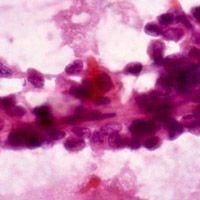Potential Discovery of Pancreatic Cancerous Cell Mechanisms
Researchers at Huntsman Cancer Institute (HCI) at the University of Utah recently discovered the mechanism potentially triggering pancreatic cancer from the defects resulting from extrusion, the process through which cells are squeezed out of overcrowded tissue to die.

Researchers at Huntsman Cancer Institute (HCI) at the University of Utah recently discovered the mechanism potentially triggering pancreatic cancer from the defects resulting from extrusion, the process through which cells are squeezed out of overcrowded tissue to die.
The study results, published in the latest edition of journal eLife, indicated potentially effective ways to reverse the defective extrusion's effects without destroying nearby normal tissues.
Jody Rosenblatt, PhD, co-author of the study, associate professor in the Department of Oncological Sciences at the University of Utah School of Medicine, and an HCI investigator and her team focused primarily on analyzing previously published microarray data and found that “a receptor for the lipid sphingosine 1-phosphate (S1P2) was significantly reduced in the most common type of pancreas cancer known as pancreatic ductal adenocarcinoma (PDAC), lung cancer, and some types of colon cancer — all aggressive cancers that resist treatment with chemotherapy.”
Rosenblatt said, "This kind of altered extrusion may be a common hallmark of invasive tumor types. While the mechanisms that drive tumor cell invasion are not yet clear, the results suggest that S1P2-mediated extrusion may play an important role in metastatic cell invasion."
Prior research had consistently listed all these conditions--masses of cells, resistance to cell death, invasive activity, and chronic inflammation--as determining factors of cells becoming tumors and progressing into metastasis.
The authors noted, "Some FAK inhibitors are already being tested in clinical trials for other types of cancers. Hopefully, they may also be a better therapy for recalcitrant tumors such as pancreas cancers and some lung cancers.”
“We need to see if we can target cells that have moved to other sites, or metastasized, with FAK inhibitors, since this is an important feature of pancreatic cancer. That's the next phase of our study," concluded Rosenblatt.